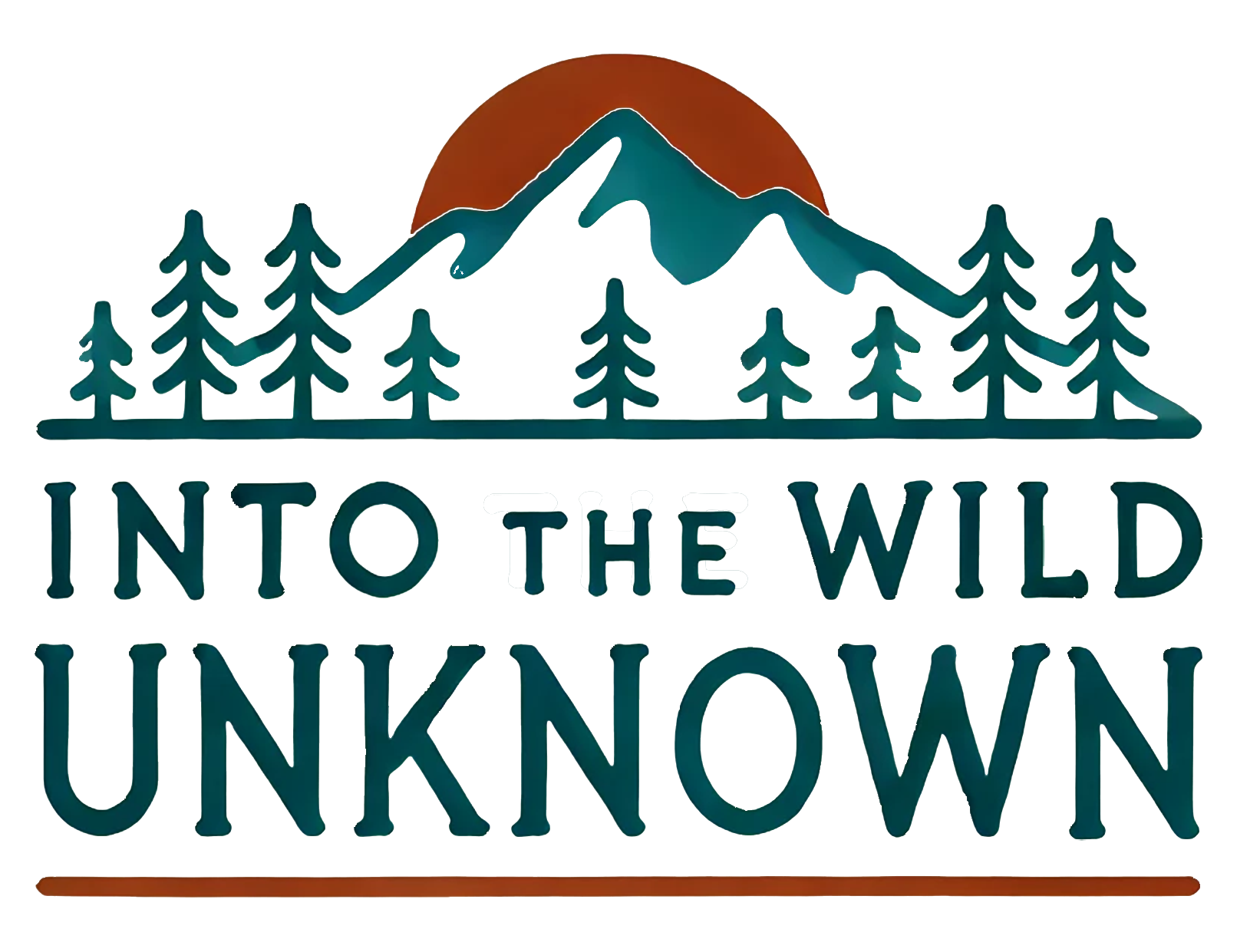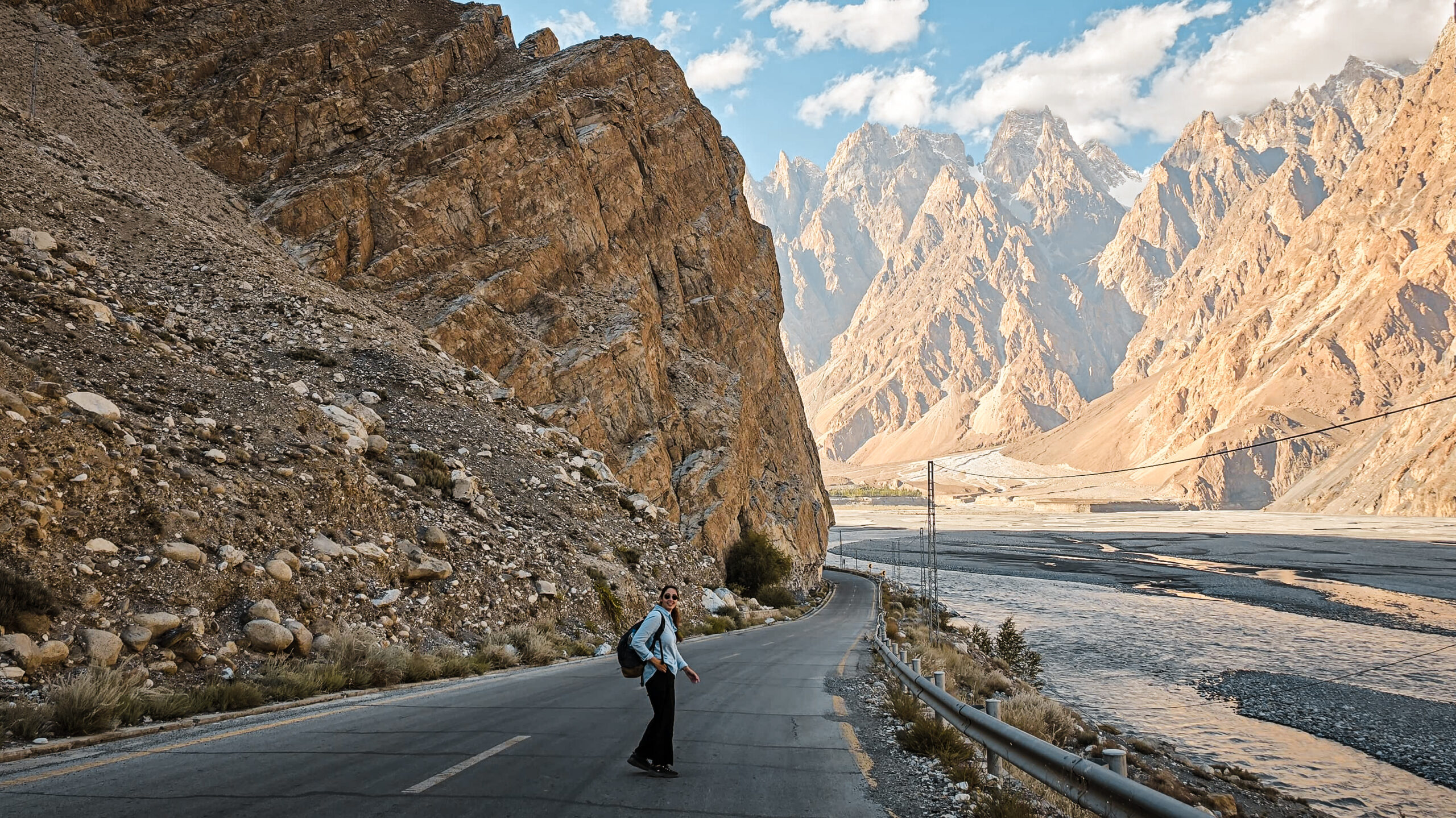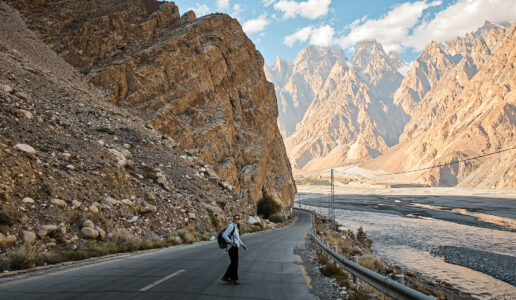When I first told people I was planning to travel solo through Pakistan, the reactions were swift and dramatic: “Are you crazy?”, “Isn’t it dangerous?”, “Why Pakistan of all places?” The question on everyone’s mind was the same: is Pakistan safe for solo female travellers?
It’s a country that’s often portrayed in the media as unstable, conservative, and unsafe, especially for women. I won’t lie: I had some reservations too. As a solo female traveller with a backpack and a camera, I wondered what kind of experience I’d be walking into. Would I be harassed? Would I even be allowed to travel alone in some places?
But curiosity outweighed the fear. And what I found on the ground was a reality far more complex, and far more beautiful, than anything I had imagined.
In this post, I want to share an honest account of my 5 months in Northern Pakistan (I’ve been to the country twice) and what it’s like to travel there as a solo female traveller. I’ll talk about where I went, how I was treated, what felt safe (and what didn’t), and share practical tips for anyone considering a similar journey. Whether you’re dreaming of exploring the Hunza Valley or just wondering if Pakistan is a realistic destination for independent travellers, I hope this gives you a clearer picture beyond the distorted media headlines.
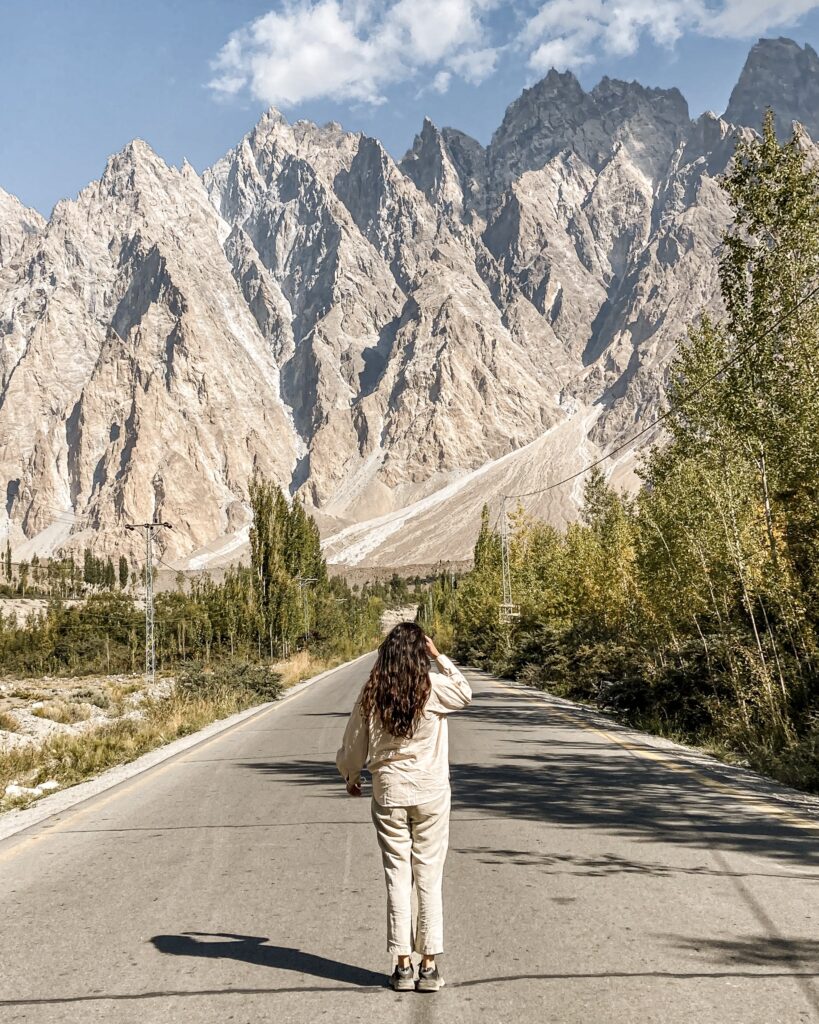
Is Pakistan Safe for Solo Female Travellers? Breaking the Stereotypes
When researching Pakistan, you’ll quickly notice that official government websites often paint the country as a risky destination. The UK Foreign Office Travel Advice and the US State Department Travel Advisory both highlight certain regions as unsafe due to political instability terrorism, and women’s rights violations. While these warnings shouldn’t be completely ignored, they don’t necessarily reflect the everyday reality for travellers, especially in the more popular areas. It was easy to believe that the country was too dangerous, too conservative, too unpredictable for a woman travelling alone. But what you’ll discover, will challenge nearly every assumption.
Yes, Pakistan has its complexities, but the overwhelming narrative of fear doesn’t reflect the reality I experienced. What the headlines don’t tell you is how strangers stop to offer help without expecting anything in return. How families invite you into their homes for chai within minutes of meeting you. How people go out of their way to make sure you’re safe, comfortable, and cared for simply because you’re a guest in their country.
Of course, I didn’t walk in blindly. I knew travelling in Pakistan, especially as a solo female, would require a certain level of caution, cultural sensitivity, and preparation. But I quickly realised that most of the fear surrounding the country comes from a lack of understanding, not actual risk.
Travelling Pakistan isn’t like travelling in Europe or Southeast Asia. It demands a different mindset. But it’s precisely this contrast that makes it so powerful, so rewarding, and so deeply misunderstood.
Where I Travelled in Pakistan as a Solo Female Traveller
I began my journey in Islamabad, but it wasn’t long before I was heading north to the mountains, where I would end up spending most of my time. Over the course of several months, I travelled extensively through Gilgit-Baltistan, primarily in the Hunza and Skardu regions. This is where Pakistan truly captured my heart.
In Hunza, I explored charming mountain villages like Karimabad and Passu, crossed suspension bridges, and ventured off the main tourist trail to Shimshal, Chapursan, and Misgar Valleys. I even hitchhiked all the way up to the Khunjerab Pass, the dramatic high-altitude gateway to China.
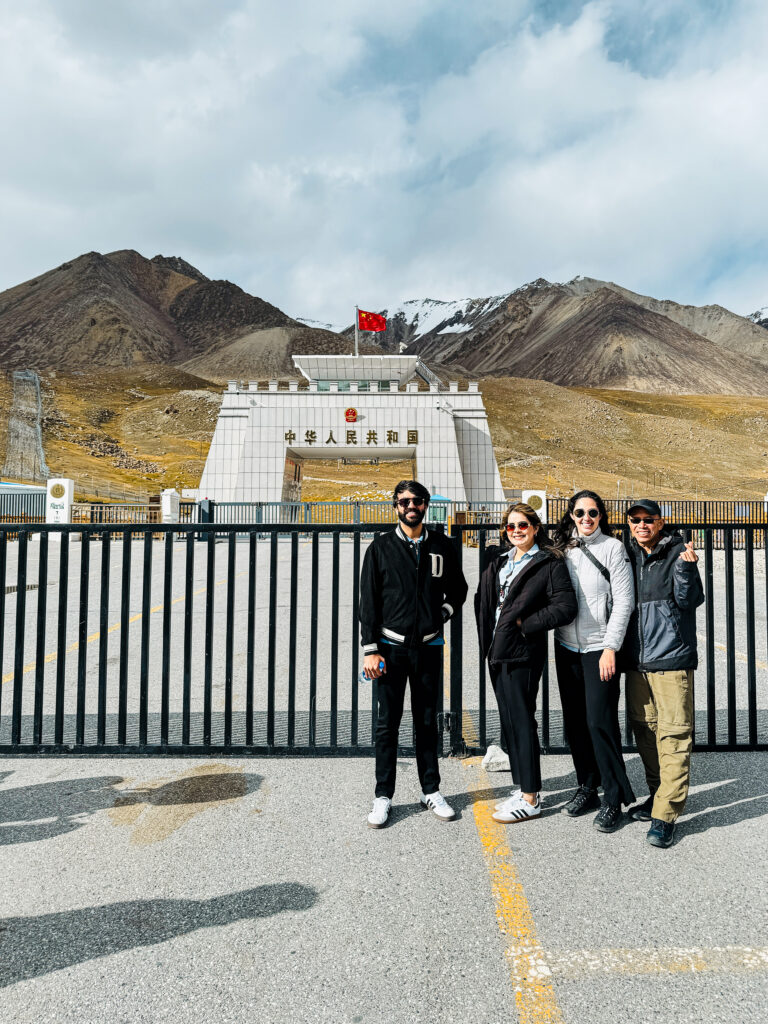
I did several treks, some completely alone and others with a local guide. I hiked solo to both Fairy Meadows and Rakaposhi Base Camp, meeting curious locals and fellow travellers. The highlight of my time in the mountains, though, was the Patundas Meadows trek – an unforgettable multi-day hike that took me across a glacier and into a wild, otherworldly plateau above the Passu Glacier.
I spent a few weeks in the Skardu region, where the landscapes grew even more dramatic and raw. I wandered through high-altitude deserts, turquoise lakes, and winding mountain roads that left me speechless.
I also made my way west to the Kalash Valley, one of the most culturally distinct areas in Pakistan. Nestled in the Chitral District, the Kalash communities live in remote mountain villages where ancient traditions are still part of daily life.
At last I’ve also spent a couple of weeks in the big cities of Lahore and Peshawar which is known to be one the most conservative and “dangerous” areas in the country near the Afghan border.
I travelled almost entirely by public transport – long-distance buses, shared vans, and jeeps – and occasionally hitchhiked in places where transport was scarce. In most regions, I might’ve not been the only foreigner, but I was definitely the only solo female traveller.
Interaction with Locals in Pakistan
If there’s one thing that stands out most from my time in Pakistan, it’s the people. The hospitality I experienced went far beyond what I’d ever encountered elsewhere, especially as a solo traveller. Whether I was walking through a village, waiting for a bus, or hiking in the mountains, it wasn’t unusual for strangers to approach me with a warm smile, a cup of chai, or simply a curious “Where are you from?”
In the more tourist-friendly parts of Hunza, locals are used to seeing foreign travellers, but many were still surprised to see a woman travelling alone. In more remote areas, the curiosity was even stronger – always respectful, though sometimes intense. I was often offered food, invited into people’s homes, or gently questioned about why I was alone and whether I was married.
There were moments, of course, when I felt the weight of being a foreign woman in a male-dominated society. Prolonged stares were common, especially in bus stations or in less touristy regions. But more often than not, I found that people went out of their way to make sure I was safe and looked after.
The women I met, though fewer in number in public spaces, were equally curious and incredibly kind. Some approached me shyly just to say hello or ask for a photo, while others invited me into their homes for meals and conversation, especially in the mountain villages. These small moments often became the most meaningful parts of my trip.
In a country where hospitality is deeply woven into the culture, being a guest, especially a female one, means something. And although I stood out wherever I went, I never felt unwelcome.
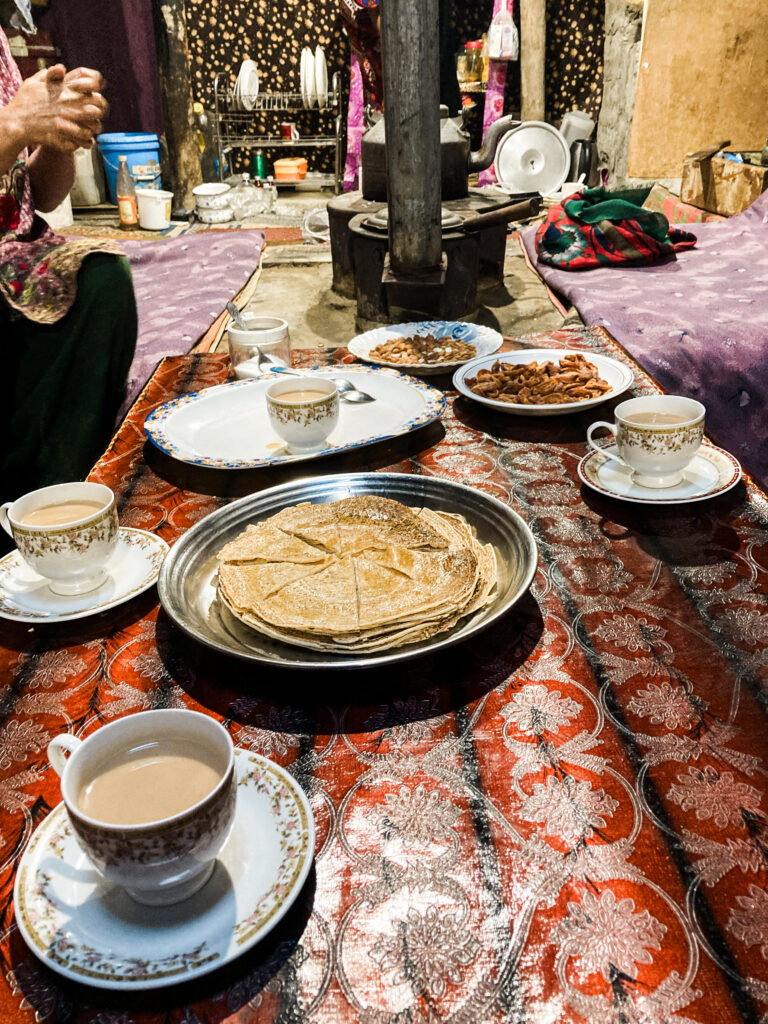
Did I Ever Feel Unsafe as a Solo Female Traveller?
This is the question I get asked the most, and the one that’s hardest to answer with a simple yes or no.
For the most part, I didn’t feel unsafe during my travels in Pakistan. I felt watched, yes. Stared at, absolutely. But not unsafe in the sense of being in immediate danger. The attention can be intense but it didn’t cross the line into harassment.
That said, there were moments that made me uncomfortable. Like being the only woman on a crowded local bus with forty men staring at me in silence. Or walking through a bazaar and feeling dozens of eyes track my every move. These moments weren’t threatening, but they were exhausting. I had to constantly assess my surroundings, read body language, and sometimes trust my gut over logic.
I was also stopped at a few police checkpoints, especially near border regions. While this might sound intimidating, the officers were generally polite, sometimes even overprotective.
Importantly, I never experienced actual harassment, theft, or physical danger, things that have happened to me in supposedly “safe” countries. I also never felt that being a foreign woman automatically put me at risk. In many cases, it actually worked in my favour: people looked out for me more, offered help, or gave me space.
That said, Pakistan isn’t a place where you can switch off. It’s not a destination for carefree wandering or spontaneous decision-making. It requires awareness, cultural respect, and a good amount of patience. But that heightened awareness also creates a deeper kind of travel, where you’re more engaged, more alert, and more connected to the world around you.
Tips for Women Travelling Solo in Pakistan
Travelling in Pakistan requires a different approach than more conventional backpacking destinations. It’s not a place where you can completely let your guard down—but with the right mindset, preparation, and cultural awareness, it can be incredibly rewarding and safe. Here are some of the key things that helped me stay safe and comfortable on the road:
1. Dress modestly.
This goes a long way in gaining respect and avoiding unnecessary attention. I wore loose trousers, covered my arms and legs, and usually carried a scarf to cover my chest or hair when needed, especially in more conservative areas.
2. Trust your instincts.
If something feels off, it probably is. I changed seats on buses, declined invitations, and left places early when I felt uncomfortable. But this is true everywhere you go, even in your hometown.
3. Use local transport smartly.
I avoided travelling after dark unless I had no choice, and sat near families or other women on buses and vans. When hitchhiking (which I did occasionally in remote areas), I made sure it felt safe and always trusted my gut.
4. Learn a few words of Urdu.
Even just saying shukriya (thank you) can break the ice and earn you smiles. People will appreciate the effort.
5. Stay with recommended guesthouses or families.
In smaller towns and villages, ask locals where a safe and trusted place to stay is. Guesthouses in northern Pakistan tend to be family-run and welcoming to solo women.
6. Be aware of restricted areas.
Some border regions require permits or are off-limits to foreigners entirely. Do a bit of research before heading somewhere remote as rules can change quickly and without much notice.
7. Connect with other travellers.
Meeting fellow backpackers, especially other women, was rare but always helpful. We shared safety tips, routes, and sometimes travelled together for short stretches.
8. Carry a local SIM card.
Having mobile data (and using Google Maps, WhatsApp, or location sharing) made a big difference in navigating and staying connected, especially in case of emergencies.
Pakistan isn’t the easiest destination to travel solo as a woman, but that’s part of what makes it so powerful. With awareness and respect for the culture, you can have an unforgettable experience and feel safe doing it.
Benefits of Travelling Pakistan
While Pakistan might seem like a daunting choice at first glance, travelling here as a solo woman comes with its own unique set of rewards, many of which I never expected when I first set out.
1. Genuine human connection.
Because solo travellers are still rare in Pakistan, people are often genuinely curious and eager to help. I found that doors opened more easily, conversations went deeper, and connections felt more meaningful simply because I was travelling alone.
2. A different kind of hospitality.
Pakistani hospitality is legendary, but as a solo woman, it often came with an extra layer of care. Families invited me for meals, strangers looked out for me on buses, and I was frequently treated like a daughter or sister. It was humbling and heart-warming.
3. Empowerment through challenge.
Travelling Pakistan isn’t always easy, but that’s exactly why it’s so powerful. Facing unfamiliar situations, navigating male-dominated spaces, and pushing through moments of discomfort made me realise just how capable and strong I really am.
4. A deeper cultural immersion.
Because I stood out more, people constantly engaged with me. I was invited into homes, asked questions, and encouraged to participate in local customs. These weren’t curated “tourist experiences”: they were raw, real, and unforgettable.
5. Unique travel stories.
While others might write about sunsets in Bali or cafés in Paris, Pakistan gave me stories of crossing glaciers, drinking tea with locals in the more remote places, or celebratory dances in the mountains. It’s a destination that stands out for all the right reasons.
6. Redefining perceptions.
Just by showing up, I was challenging stereotypes: both theirs and mine. Locals often told me, “You are very brave,” but honestly, I felt like I was the one being educated and changed through these encounters.
7. Unfiltered adventure.
In Pakistan, you don’t just travel: you feel everything more intensely. The highs are higher, the challenges are sharper, and the beauty – whether in the mountains or in human kindness – is absolutely unfiltered.
Things I wish I knew before travelling to Pakistan
No matter how much research you do, Pakistan is a country that defies expectations. Looking back, there are a few things I wish I’d known before my trip: things that would’ve made those first few days smoother and helped me settle into the rhythm of the country more quickly.
1. The logistics can be unpredictable.
Buses don’t always leave on time, road closures are common in the mountains, and sometimes you just have to wait – for hours. Flexibility isn’t just helpful; it’s essential.
2. The north is like a different world.
Gilgit-Baltistan feels vastly different from other parts of Pakistan. Culturally, geographically, and even in terms of how women are perceived. People are used to tourists there, and I felt noticeably more comfortable and at ease compared to other regions.
3. You won’t see many women.
Public spaces are overwhelmingly male. It took me a while to get used to this, and it can sometimes feel isolating. But the upside is that when you do meet local women, usually through families or inside homes, the interactions feel extra special.
4. You’ll need to explain yourself – A Lot!
“Are you married?” “Why are you alone?” “Where is your boyfriend?” Get ready for endless questions, often asked with genuine curiosity rather than judgement. A smile and a patient answer go a long way, but having a polite excuse ready (like “my boyfriend is back home”) can also help avoid awkwardness.
5. It’s okay to say no.
Hospitality is huge, and people will constantly offer chai, rides, food, even places to stay. While most offers are genuine, you’re under no obligation to say yes. It’s okay to decline politely and protect your space.
6. SIM cards and cash are your lifelines.
Many remote areas have patchy service (or none at all), and ATMs aren’t always reliable. Having a local SIM with mobile data and carrying enough cash for several days can save you a lot of stress.
7. The police might escort you – for your “safety.”
Especially near borders or remote regions, police sometimes insist on following or escorting foreigners. It’s usually harmless (and occasionally helpful), but it can feel a bit overwhelming. Knowing this in advance can be helpful.
8. It will change you.
I didn’t expect Pakistan to impact me so deeply. But the kindness of strangers, the epic mountain landscapes, and the emotional intensity of travelling as a woman here, it all left a mark. You won’t come back the same.
Would I recommend Travelling Pakistan as a Solo Female Traveller?
Simply put: yes, but with some important caveats.
Pakistan is not a typical tourist destination, nor is it an easy place to travel solo as a woman. It demands patience, cultural sensitivity, and a strong sense of self-reliance. If you’re looking for luxury, convenience, or a stress-free trip, this might not be the right place.
That said, for those willing to embrace its challenges, Pakistan offers something truly rare: a chance to explore some of the world’s most breathtaking landscapes, to connect with people whose kindness and hospitality will leave a lasting impression, and to experience a culture that few travellers have the courage to engage with deeply.
If you prepare well, stay aware, and keep an open heart, Pakistan can be one of the most rewarding, and safest, destinations you’ll ever visit as a solo female traveller. It pushes you outside your comfort zone, but in doing so, it expands your horizons in ways you never imagined.
Would I travel there again alone? Absolutely. I’m currently planning my trip to go back this year.
Final Thoughts: Should You Travel to Pakistan Alone?
Travelling solo in Pakistan as a woman isn’t without its challenges, but it’s also filled with unforgettable moments, profound connections, and breathtaking adventures. From the towering peaks of Gilgit-Baltistan to remote villages in forgotten valleys, I discovered a side of the world that very few get to see.
If you approach Pakistan with respect, patience, and more importantly an open mind, you’ll find a land of warmth, colour, and resilience that challenges every stereotype. It’s not a destination to rush through or take lightly – it demands your full attention, cultural sensitivity, and sometimes a little grit.
But the rewards far outweigh the difficulties.
For any solo female traveller seeking a journey that is as much about self-discovery as it is about exploring new places, Pakistan is a remarkable choice.
So, is travelling Pakistan safe? It can be – if you travel wisely, listen to your instincts, and embrace the discomfort and the unknown.
If you’re considering Pakistan for your own adventure, you might also find my other guides helpful. For a taste of the country’s legendary road trips, check out my post on travelling the Karakoram Highway by public transport. If mountains are calling, don’t miss my complete guide to trekking in Pakistan, where I cover both day hikes and multi-day expeditions. And for broader inspiration on long-term, independent and affordable travel, my guide to backpacking solo on a budget shares all the practical tips as well as different itineraries in Northern Pakistan.
